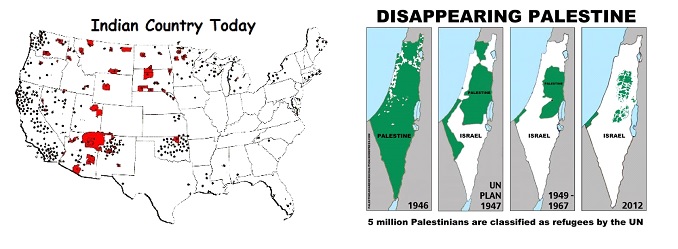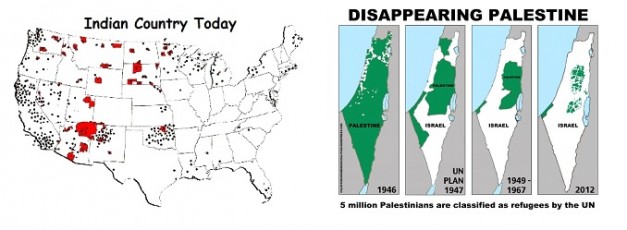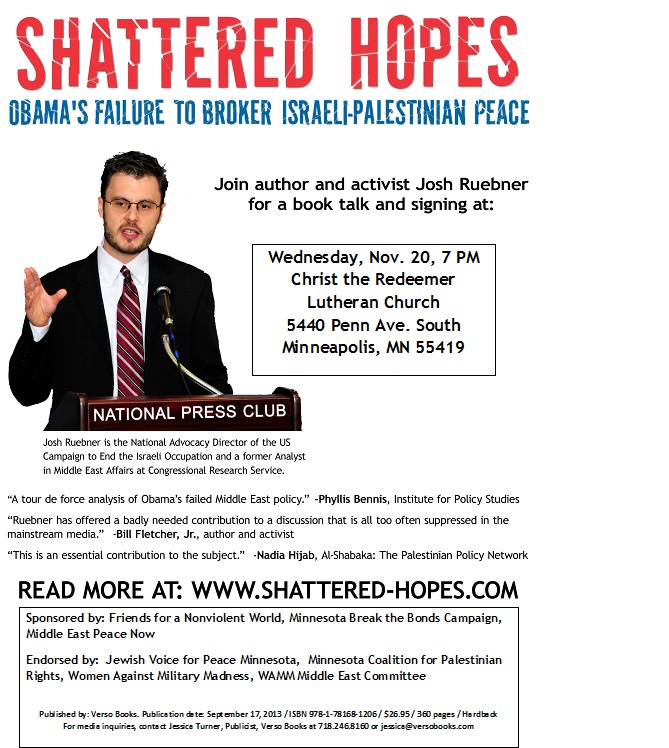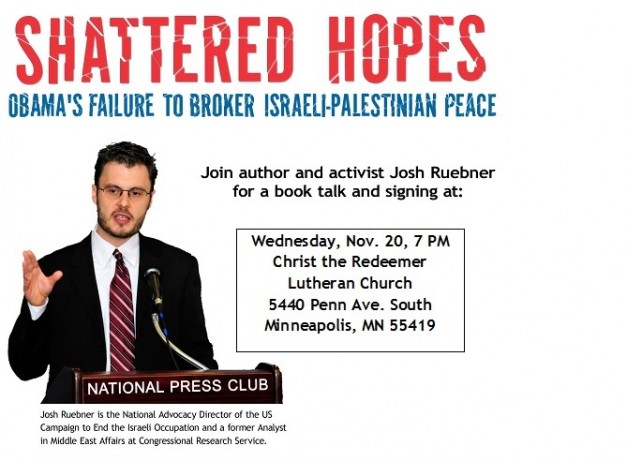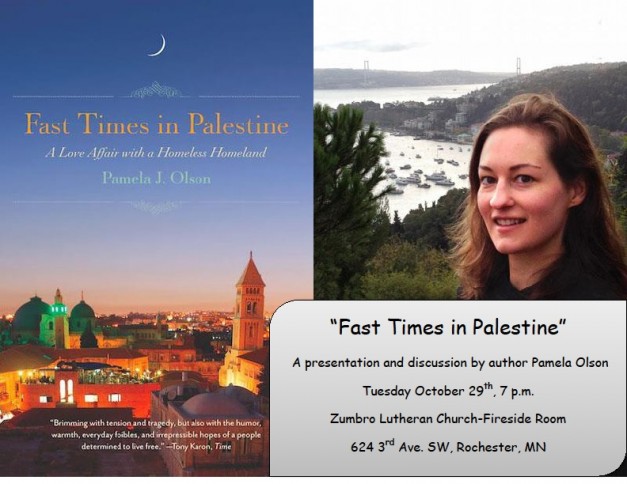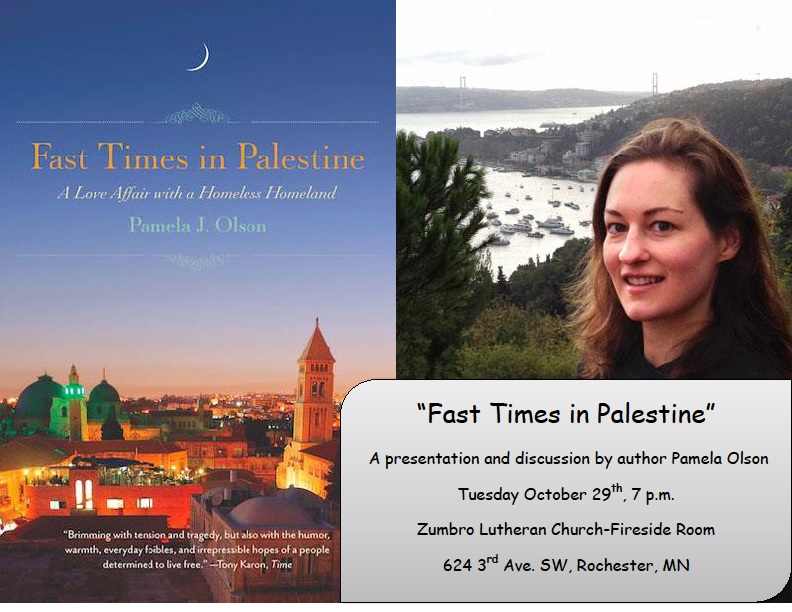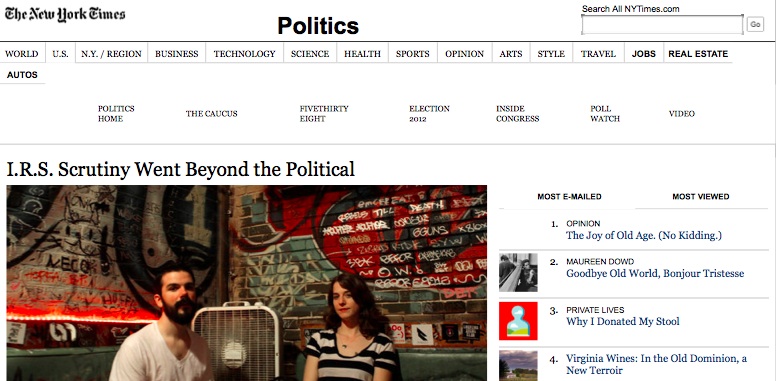Update February 1, 2014: President Eric Kaler wrote a response to the open letter and mailed it to one of our members. His response is copied below the signatures.
Update January 25, 2014: The letter is now closed for signatures. A hard copy was sent to Eric Kaler and it was posted in the Minnesota Daily (slightly edited from the version below). The signatures have been added to the letter. If you wanted to add your signature and didn’t get a chance, write a short note to Kaler with the reasons you support the ASA boycott.
University of Minnesota President Eric Kaler wrote a statement denouncing the American Studies Association’s vote to boycott Israeli academic institutions. The following letter to Kaler was written by members of the Minnesota Coalition for Palestinian Rights, of which Minnesota Break the Bonds Campaign is an organizational member. The letter will be sent to Kaler during the week of January 7. If you would like to sign on to the letter, send an email to mn@breakthebonds.org with your name, affiliation, and any credentials to include in the signature.
Open Letter to Dr. Eric W. Kaler, President of the University of Minnesota
Dear Dr. Kaler,
The undersigned are individuals and organizations from Minnesota and beyond who are dismayed with your statement of December 27, 2013 opposing the American Studies Association resolution to boycott Israeli institutions.
Your statement quotes extensively from the statement put out by the Association of American Universities, making the unsubstantiated and inaccurate claim that such a boycott violates academic freedom. The AAU’s quote has no relevance to the ASA resolution or any of the written debate or conversations beginning in 2007 that led up to the overwhelming vote in favor of the boycott. These writings are available for anyone to study and we encourage you to read them in The Journal of Academic Freedom.
Contrary to your statement, the ASA resolution does not call for a boycott against any individual. The boycott is only against Israeli institutions. The ASA’s resolution is a response to the call of the overwhelming majority of Palestinian civil society organizations, including trade unions, NGOs, and student groups. It is carefully structured to focus on Israeli institutions that have been complicit and often active participants in Israel’s well-documented violations of international law and universal principles of human rights.
Colleges and universities have sought to be places where discussion and debate can freely take place. This is not the case in Israel, where institutions of higher education are complicit in the oppression of Palestinians, and the repression of their speech. For example, Palestinian Israeli citizens who attend Israeli universities are not allowed to organize or demonstrate on campus, and the commemoration of the expulsion of 750,000 Palestinians from their homes in 1948 is illegal. Israeli universities are built on land that was expropriated from Palestinians and the research done in those institutions contributes to oppression of Palestinians. Quoting from the ASA resolution: “…there is no effective or substantive academic freedom for Palestinian students and scholars under conditions of Israeli occupation, and Israeli institutions of higher learning are a party to Israeli state policies that violate human rights and negatively impact the working conditions of Palestinian scholars and students…”
Additionally, the ASA resolution does not single out any ethnic group for boycott. The resolution is not anti-Semitic or racist in any way; on the contrary, its statement says: “…American Studies Association is committed to the pursuit of social justice, to the struggle against all forms of racism, including anti-semitism, discrimination, and xenophobia…”
We believe that those who are genuinely concerned with academic freedom should deplore the lack of academic freedom that Palestinians experience due to Israeli institutional constraints on their movement. During the first Intifada, Palestinian schools in the West Bank and Gaza were closed, including kindergartens through colleges. Attending classes and even carrying textbooks were crimes punishable by prison sentences. Now Palestinian children and young adults face overwhelming difficulties in getting to classes because of the restrictions on their movements in the occupied territories. Two-hour waits at checkpoints to move from one part of the West Bank to another part of the West Bank (not even into Israeli territory) are common. Often Palestinians are not allowed to make the trip at all. The detrimental effect these checkpoints have on learning and advancing educationally, on academic freedom, cannot be overstated.
Because of Israel’s siege of Gaza, almost no students are allowed out of the territory to study, even those with scholarships to study at western schools and universities. Palestinian students from Gaza are even routinely denied the right to study in the West Bank. This affected one gifted student from Gaza who had been a high school exchange student in Wayzata during 2011-2012. She received a Fulbright scholarship to study at Birzeit University in the West Bank, but the Israeli government has denied her a permit to travel. This is a clear violation of academic freedom.
The undersigned believe that your statement does not advance the cause of academic freedom, but will actually have the effect of repressing debate and discussion on campus. We support free speech and the freedom to act in constitutionally protected ways to express political beliefs. We support the American Studies Association’s resolution to boycott Israeli institutions until Israel complies with international law. We encourage you to allow a free debate at the University of Minnesota on academic and cultural boycotts and thus demonstrate that the University of Minnesota is an institution which supports open discussion and academic freedom.
Signatories of open letter to President Kaler
Individuals:
- Dorothy Diehl, Associate Professor, St. Mary’s University of MN
- Lisa Albrecht, Ph.D., Associate Professor, & Morse-MN Alumni Association, Distinguished Professor of Teaching, & Founder, Social Justice Undergraduate Minor, School of Social Work, College of Education & Human Development, University of Minnesota (& a Jew who supports the Break the Bonds Campaign)
- Dr. David N. Pellow, Professor, University of MN
- Roderick Ferguson, Ph. D., Departments of American Studies, Gender, Women and Sexuality Studies, and African American and African Studies, University of MN
- Lucia Wilkes Smith, BS, College of Education, University of MN, 1967, MA, Department of American Studies, University of MN, MFA, Writing, Hamline University, 2001, member of ASA
- Carol Brunholzl, Alumna, U of MN, 1952
- Jill Manskey, Graduate student, U of MN
- Ashraf Ashkar, Staff, University of MN, Morris
- Yusuf Abul-Hajj, Professor of Medicinal Chemistry, UM
- Matthew Boynton, Graduate Student, American Studies
- Vincent Stravino, M.D., Alumnus of U of MN, 1970, Grandparent of potential student in MN, class of 2019.
- Sylvia Schwarz, B.S. Chemical Engineering, University of MN, 1984, M.S. Civil Engineering, University of MN, 1991, member of Minnesota Break the Bonds Campaign (MN BBC), member of the International Jewish Anti-Zionist Network (IJAN)
- Anonymous, alumnus University of MN, 2013
- Amber Michel, current graduate student, Master of Liberal Studies, University of MN
- D.J. Sholtz, UM Alumna (Ph.D.), Professor Emerita, MN State University System
- Mary Beaudoin, U of MN, College of Liberal Arts, Class of 1971
- Dominique Najjar, U of MN alumnus, 1977
- Pamela Nice, Ph. D., U of MN, 1984, Steering Committee member of Jewish Voice for Peace, DC-Metro
- Raphi Rechitsky, Department of Sociology, U of MN
- Jigna Desai, Department of Gender, Women, and Sexuality Studies, U of MN
- Jordan S. Kushner, Attorney, U of MN, School of Law, 1991.
- Mary Everson Engen, MA, Communication Disorders, U of MN, 1971.
- Emily Lindell, Past student of U of MN and current staff member
- Robert Kosuth, Ph. D U of MN, former Director of Office of International Programs, U of Wisconsin, Superior
- Juliana Hu Pegues, Postdoctoral Fellow, Macalester College, Ph.D. in American Studies, University of Minnesota, Member of American Studies Association, Association for Asian American Studies, Native American and Indigenous Studies Association.
- Sandy Clark, Graduate degree in English, University of MN
- SooJin Pate, UMN alumni (graduate class of 2010), Visiting Assistant Professor in American Studies, Macalester College
- Calvin Miner, U of M Duluth, student in the School of Engineering
- TINEKE RITMEESTER, Ph.D., Associate Professor of Women, Gender and Sexuality Studies, University of Minnesota-Duluth
- Vern Simula, UMD Professor Emeritus
- Penny Cragun, Director at the University of MN, Duluth
- Karisa Butler-Wall, Ph.D. Candidate, Department of American Studies, University of Minnesota
- Yusuf Towns, IV, University of MN Alumna, English Lecturer, Al Iman University, Saudi Arabia
- Anya Achtenberg, University of MN Alumna, Educator and Writer
- Mariam El Khatib, student, University of MN, Minneapolis
- Esther Ouray, Minneapolis, MN
- Bill McGrath, Northfield, MN
- Jeanette Hartley, Northfield, MN
- Newland F. Smith, 3rd, Librarian Emeritus, Seabury-Western Theological Seminary, Evanston, IL
- Dr. Peter Rachleff, Professor of History, Macalester College
- Allison K. Smith, Northfield, MN
- Isra Salem
- David Nir, Israeli academic
- Ronnie Barkan, Boycott from Within, Tel Aviv
- Renen Raz, Boycott from Within, One Democratic State in Palestine
- Heidi Uppgaard, Minneapolis, MN
- Fadia Abulhajj, Bloomington, MN
- Darlene Coffman, Rochester, MN
- Elizabeth G. Burr, Ph. D., Community Faculty, Metropolitan University, member of American Academy of Religion (AAR), co-author of Understanding World Religions: A Road Map for Justice and Peace, Rowman & Littlefield, 2007, 2nd edition, 2014.
- Jonathan E. Hill, Professor Emeritus of English, St. Olaf College, Northfield, MN
- Stefanie Levi, Socialist Action
- Fr. David Whitten Smith, STD; SSL, Emeritus Professor of Theology; Justice and Peace Studies University of St. Thomas
- Phil Benson, Attorney, MN
- Melissa Favero, Elementary School Teacher, member of Temple Israel
- Dorothy Naor, Herzliah, Israel
- Josina Manu, Minneapolis, MN
- Cathy Sultan
- Laura Stone-Jeraj, Attorney-at-Law, St. Paul, MN
- Ray Tricomo
- Daniel Craig Jensen, Eden Prairie, MN
- Linda L. Houghton, Washington D.C., member of Jewish Voice for Peace and US Campaign to End the Occupation
- Coleen Rowley, Apple Valley
- Hussein S. Khatib, National American Muslims for Palestine (AMP) Board Member
- Cindy O’Neill-Kiley, Rochester, MN
- Barbara Powell, Rochester, MN
- Richard Van Dellen MD, Rochester, MN
- Augusta Braga, Rochester, MN
- Joe and Elaine Mayer, Rochester, MN
- Jean Chovan, Rochester, MN
- David A. Bakken, Rochester, MN
- Ruthann Yaeger, Rochester, MN
- Robert K. Johnson, Harmony, MN
- Joy Johnson, Harmony, MN
- Rev. Dale Stuepfert, President of the Board of Middle East Peace Now (MEPN), Minneapolis, MN
- Will Doolittle and Misa Joo, Eugene, OR
- Susanne Waldorf, Ph. D. student, Department of Humanities, Social Sciences and Social Justice Education, Ontario Institute for Studies in Education (OISE)/University of Toronto
- Melly Ailabouni
- Margaret Sarfehjooy, Minneapolis
- Lex Horan
- Sanna Nimtz Towns, Ph. D., Past Fulbright Scholar, Slovakia and Qatar
- Mackie Joseph Venet Blanton, Ph. D.
- Georgette Iuop, Ph. D., Professor of Linguistics, Emerita, University of New Orleans
- David Reisenweber, Retired Social Studies Teacher, Farmer, Duluth, MN
- Ellen Klemme, Teacher, St. Paul
- Shea Peeples, Minneapolis
- Karl Habeck, Library Clerk, Sherman & Ruth Weiss Community Library, Hayward, WI
- Elisabeth Geschiere, Minneapolis
Organizations:
- Minnesota Break the Bonds Campaign
- Minnesota Coalition for Palestinian Rights
- Anti-War Committee
- Middle East Peace Now
- Women Against Military Madness (WAMM) – Middle East Committee
- Students for Justice in Palestine (SJP), University of Minnesota
- National Lawyers Guild – Minnesota Chapter
- Twin Ports Break the Bonds
Response from Eric Kaler:
January 30, 2014
To the signatories of the open letter regarding the American Studies Association’s (ASA) boycott:
Thank you for taking the time to share your concerns with me. I agree with you that the ASA’s action appears to limit only the association’s professional activities and not the scholarly activities of individual faculty members. However, it is the fact of the boycott itself that undermines academic freedom. As articulated in the statement issued by the AAU:
Efforts to address political issues, or to address restrictions on academic freedom, should not themselves infringe upon academic freedom. Restrictions imposed on the ability of scholars of any particular country to work with their fellow academics in other countries, participate in meetings and organizations, or otherwise carry out their scholarly activities violate academic freedom.
We have just a few bedrock tenets at the University of Minnesota, and one of them is academic freedom. Civil debate is appropriate, necessary, and welcome. Your ability to express to me your disagreement with my stance on the ASA’s resolution is a testament to the reality that academic freedom is alive and well here, and I encourage you to continue to exercise your right to share and defend your ideas and opinions through respectful discussion.
Thank you for your dedication to the University of Minnesota.
Sincerely,
Eric W. Kaler
President




